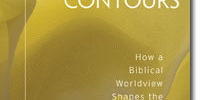
Ardel Caneday’s Contribution to the New Book “Christian Contours”
Our readers may be interested to know that Dr. Ardel Caneday, Professor of New Testament Studies and Biblical Studies at Northwestern College in St. Paul, Minnesota and regular blogger here at Credo, recently contributed a chapter to a new book entitled Christian Contours: How a Biblical Worldview Shapes the Mind and Heart (Kregel Academic, 2012). Dr. Caneday’s chapter is entitled, “How Can I Live Out the Biblical Worldview in a Culture that Does Not Share that Worldview?” (Chapter 7). He introduces the discussion by writing:
“In the mix of worldviews present in today’s culture, Christianity has historically had varying degrees of impact. Because of Christianity’s influence upon the world’s cultures, biblical concepts and terminology have significantly (but not at all perfectly) transformed many aspects of culture, especially within Western cultures. Even with the rise of modernism more than a century ago, much of Christianity’s influence has remained intact, especially within the realm of public discourse.
“In recent decades, however, the encroachment of philosophical pluralism upon the West has increasingly altered public discourse. Many of the worldviews present today share what amounts to philosophical pluralism’s common mantra: ‘There is no such thing as absolute truth.’ While allowing for Christianity as one belief system among many, those who have come to share this common mantra may not realize that their own worldviews owe much to (and are often distortions of) the biblical worldview. Yet, they now insist that those Christian beliefs from which they receive so many benefits can hold no universal or exclusive claims to truth. Therefore, it should come as no surprise that those who embrace various forms of philosophical pluralism routinely and heavily borrow and use Christian terminology in ways that imitate and counterfeit—but subtly subvert—the biblical view of the world and of life. Consequently, evangelical Christians are in danger of mistakenly embracing and endorsing several counterfeit concepts and causes as though those things were virtuous, Christian, and even biblically grounded.Because we who are Christians reside in this world, we continually encounter both non-biblical and anti-biblical ideas and thinking that attract our attention, even at times seducing us by the allure of these ideas to let down our guard of biblically grounded critical thinking, to embrace false beliefs partially if not wholly.”
After considering the biblical and theological teaching on the subject, as well as practical ramifications, Dr. Caneday concludes his chapter by saying:
“So, the current culture replaces universal virtues with individualized values and makes uncertainty the most prized form of humility. Tolerance toward people with whom we disagree, perhaps even vigorously, has been replaced in the public square with tolerance for ideas, except for the idea of absolute truth. This in turn means that anyone who does not tolerate ideas and beliefs that formerly were universally condemned stands condemned as intolerant. This is where true followers of Jesus will find themselves. But this is no surprise. Inevitably everyone who lives a godly life in Christ Jesus will encounter controversy, for to live the Christian life necessarily entails controverting the culture in which we live (cf. 2 Tim. 3:12).
“Following Christ Jesus as his disciples requires us daily to pick up the instrument of death to self, the cross, and to deny ourselves (Luke 9:23). As we endeavor to live out the biblical worldview, if we lose sight of this and instead desire to save ourselves from pluralism’s frown, rebuke, and hostilities, we will lose our lives forever in perdition. We must be willing to endure inconveniences and even hostilities for the sake of Christ and the gospel, for otherwise of what benefit is the biblical worldview that we desire others to embrace? The gospel’s consolation to us is that all who lose their life for Christ’s sake will be saved (Luke 9:24).”
For all those concerned to live out biblical Christianity in a world of radically diverse perspectives, Christian Contours: How a Biblical Worldview Shapes the Mind and Heart may be a very helpful resource.
Timothy Raymond is an editor for Credo Magazine. He has been the pastor of Trinity Baptist Church in Muncie, Indiana since April 2006. He received his MDiv from the Baptist Bible Seminary of Pennsylvania in 2004 and has pursued further education through the Christian Counseling and Educational Foundation. Tim grew up outside Syracuse, NY and previously served at Berean Baptist Church, Nicholson, PA (member and teacher during college and seminary) and Calvary Baptist Church, Sandusky, Ohio (seminary internship location). Tim met his wife Bethany at college, and they were married in May 2001. Tim enjoys reading, weight-lifting, wrestling with his three sons, and attempting to sleep.

